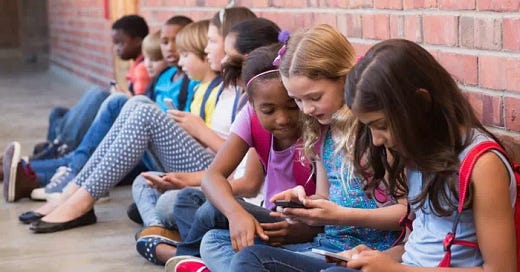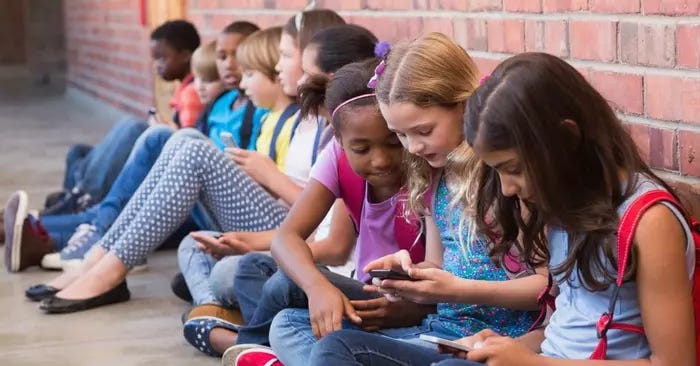It might be easier for someone of my age (mid-40s) who grew up cozily sandwiched between the famously jaded latch-key Generation X and the overly parented, participation-trophied, Millennials to see the overt dangers of the rise of smartphone usage among children.
Our childhood was analog, but our teens and early adulthood experienced the slow crawl of the Internet of Things before we were hit with the cultural meteor that was the smartphone. By then, we had at least started to develop a frontal cortex—but even with this measured introduction, we are still addicted to its steady drip of endorphins.
With the iPhone, Apple fully embodied the brand’s ubiquitous logo: Eden’s forbidden fruit. The knowledge of Good and Evil. “You can be like God and know everything,” the snake proclaimed.
And we are an insatiable breed.
Or if you’d rather Greek Mythology: we’ve been given fire. Prometheus stole the gift of technology from the land of the gods and gave it to humanity.
And we know what happens when children play with fire.
Children are tactile. They learn through sensory experiences and interactions with their parents and peers. But what if the world is becoming less tactile and more virtual? This is where we are headed. Just ask Meta and Kurzweil.
If you are a sci-fi fan, you already know what our venerated authors and filmmakers have revealed about this technological “utopia.”
Spoiler: the fruit is rotten; the fire burns.
I know, I know, what you are thinking: “Stop being an alarmist! Don’t get too dystopian.”
And I get where you are coming from, I do. We live amidst media that loves to “shock and awe” you with alarmist headlines for clickbait and attention. But if there is something we should be shocked about, it’s the disturbing data we have on smartphones’ negative effect on the mental (and physical) health of our children.
It’s worthy of our attention.
Mark Zuckerberg recently testified at a congressional hearing that there isn’t a direct correlation between social media and decreased mental health. In contrast, the chief science officer of the American Psychological Association, Mitch Prinstein, PhD told The Hill:
The APA advisory, which was based on the best available science, showed that social media is related to psychological harm through online discrimination, prejudice, hate, and cyberbullying. Research also has found that young people face serious risks when they are exposed to content about self-harm, harm to others, or eating disorders. But what is key to know is that the advisory also outlined the science behind why certain features, functions, and content on social media can be harmful to young people, whose brains have not yet fully developed.
While we should be wary of anyone saying “the science is settled” due to all the authoritarian gaslighting we’ve experienced over the last few years, we must also be aware of the motivation behind Zuckerberg’s denial of the link between our youth’s declining mental health and social media.
And let’s be honest, even die-heard Meta enthusiasts know that Zuckerberg isn’t known as a truth-teller. Even his origin story is one big lie.
Meanwhile, technocrat whistleblowers have admitted that they not only designed their product to be addictive like the gilded slot machines in Bellagio, but they also famously do not let their children near them—going so far as to send them to private, elite tech-free schools.
Even if we didn’t have this damaging data, we can logically understand that untethered access to screens crowds out other activities, and social media and (even group texts) increase the likelihood of cyberbullying.
So why are parents still handing these devices to their kids?
I have three assumptions: peer pressure, convenience, and short-term gain.
PEER PRESSURE:
Let’s look at the concept. We are fully aware of the weight of influence our children’s friends have on their development. But are we honest about the sway our social circle has on our own decisions? What if every mom or dad you associate with chose to hand over a phone much earlier than you were planning? How could you let your child be left out? Won’t they be the social pariah—all because you are the lone holdout? Perhaps, but let’s break down some seemingly legitimate justifications for well-meaning parents to acquiesce.
CONVENIENCE:
There’s no denying that allowing your child to have a smart device is convenient. This was especially true during the pandemic when learning shifted online, and parents were forced to work at home while still catering to their children’s needs. And this scenario is still true for parents of young kids.
Sometimes you must do what you can to make your situation work. My mom didn’t work outside of the house in my younger years, but I still remember during the summer months when she was probably exhausted from the arranged playdates and forcing us to play outside, my sister and I were allowed copious amounts of TV time.
We digested hours and hours of Disney, Nickelodeon, and later, MTV. Was this great? Probably not. Did she get laundry done, plan some meals, and pay the bills? Yes.
This is also true of the iPads and the educational apps. Are they better than sitting in front of the TV? Possibly. It’s certainly more interactive, which can be a boon to creativity and problem-solving skills. The stated problem isn’t needing a diversion and handing over an iPad or sitting the kids in front of a movie, though. It’s when the diversion hooks up to the larger world and becomes an appendage.
The most persistent argument I hear from parents is the need for parent-to-kid communication once that child is in after school activities. Granted, we can easily look back and see that humanity fared fine before the introduction of this technological marvel.
But yes, knowing where your child is at any given time is helpful and sometimes crucial, depending on the family structure. This is why there are better alternatives where they cannot access the internet and apps:
SHORT-TERM GAIN:
There’s an argument to be made that today’s tweens and teens are more creative and connected than past generations due to apps and social media. A musically inclined kid can now independently produce his own album and release it to the world without any gatekeepers.
A budding filmmaker can write a script, capture her visuals, and edit her masterpiece all with a small purchase of a few apps. This creative access has opened the world of possibilities and has sparked creative thinking in a new generation. But as parents, we can still relegate this to a desktop with a restricted internet connection.
And if there is a need for social media based on these creative pursuits like access to a YouTube channel to present projects, then that too can still be done from a computer with parental moderation.
Access to smartphones makes it easier to sneak that phone into bed for late-night text convos or to secretly hide unapproved apps in seemingly innocuous icons. In addition, easy internet access opens the gate to violent porn, scary rabbit holes, and online predators.
While the smartphone arguably bestows some short-term social benefits to tweens and teens, the long-term harm risks seem demoralizing. Kids who have untethered access to their devices have trouble making eye contact, let alone, mastering the art of in-person socialization.
Teens are becoming more isolated and depressed. They are forming fewer relationships and having less sex than ever. Now, I’m not gonna lie. As a parent of young boys who will soon be crazy hormone monsters, hearing that teens have less sex than past generations sounds great. But when you look deeper into the data, this downturn in sexual activity isn’t from a carefully disciplined moral consideration.
“Social media and technology use most likely affect how much person-to-person sex teens are having for the simple reason that they are spending more time online and have less face time with each other. But they are having more online sex, like sexting and Skype sex, which is still having sex, it's just facilitated through a different lens than teen sex was 10 or 20 years ago.” Dr. Holly Richmond, a sex therapist told Newsweek.
Less sex also appears to be due to a disconcerting decline in young men’s testosterone levels which have been vaguely attributed to radiation exposure, obesity, and depression—all of which can be correlated with extensive smartphone use.
So, what do we do?
We can band together with safe alternatives as mentioned above and promote informational parent meetings such as hosting a screening of the informative documentary, Childhood 2.0, inviting a professional to educate your school on the dangers of smartphones and social media, or forming an alliance with like-minded parents within your child’s age group.
However, the best thing we can do to save our children from the dangers of smartphones is to live by example and curtail our addictive behaviors which is easier said than done.






Amen sister